
The question of appeasement is back in Russia’s ‘blitz’ of Ukraine
John SudworthReport from Kyiv

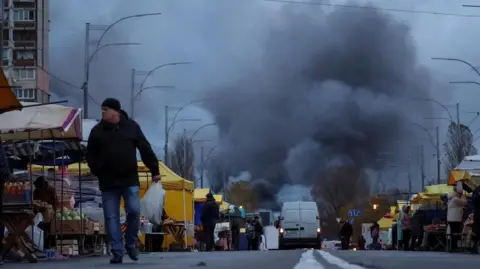 Reuters
ReutersAfter another week of intense and deadly Russian bombing of Ukrainian cities, a mixed image is circulating on Ukrainian social media.
Beneath an old, black-and-white photograph of Londoners queuing at a fruit and vegetable stall surrounded by the rubble of Blitz bombing, another image – this time in color – creates a striking juxtaposition.
Taken on Saturday, it shows shoppers crowding similar stalls in the northern suburbs of the Ukrainian capital, Kiev, while a column of black smoke rises ominously in the background.
“Bombs can’t stop markets,” reads a caption linking the two images.
The night before, the city’s slumber was once again disrupted by the now all-familiar boom of missile and drone strikes, killing two people and injuring nine.
The implication is clear. Rather than destroying public morale, Russia’s escalation of attacks on Ukrainian cities is creating a sense of resilience reminiscent of Britain in the 1940s.
When I visited the market – with black smoke still billowing from a missile attack on a nearby warehouse – that sense of courage was palpable.
But there was also a lot of fear.

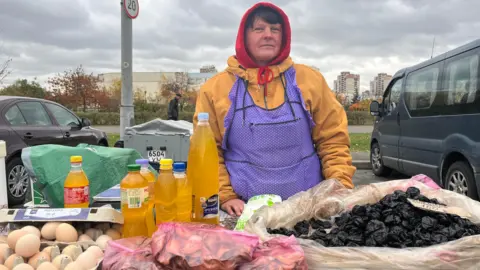
Halina, who sells dried prunes and mushrooms, told me she had little reason for optimism.
“In my opinion, according to the scriptures of the saints, this war has not yet begun.”
“It will get worse,” she added. “Too bad.”
One shopper told me she felt the force of the blast shake her house, still shaken by the experience.
Inspirational memes about the blitz-spirit are all well and good, but the biggest question for Ukraine is not how to endure this war, but how to stop it.
And with President Donald Trump proclaiming his powers as a peacemaker and pushing that question back to the center of world politics, another term from the same period in history is coming up big again – ‘appeasement’.
Since Russia annexed Crimea in 2014, the question has been whether Ukraine should fight the aggressor or negotiate with it.
But more than three years after launching a full-scale offensive, the war is entering a new phase and the word is back in the global spotlight.
On the battlefield, the fighting has reached a brutal dynamic, and Russia is now increasingly targeting Ukrainian cities far from the front lines.
Its airstrikes – using ballistic missiles, explosive-laden drones and glide bombs – have gone from an average of a few dozen a day last year to nightly, and often into the hundreds.

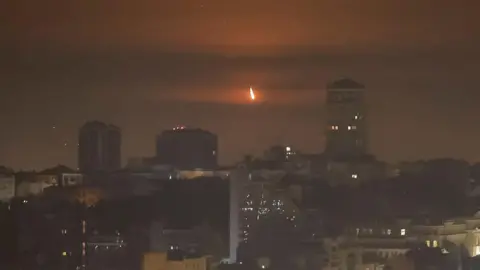 Reuters
ReutersWhat the Kremlin calls “military and paramilitary” targets now routinely include Ukraine’s civilian train stations, passenger trains, gas and electricity supplies, and homes and businesses.
According to United Nations figures, nearly 2,000 civilians have been killed this year, bringing the total since the start of the war to more than 14,000.
As well as the human toll, the economic burden is mounting rapidly, with air defense systems costing significantly more than the waves of cheap drones sent to crush them.
Just over a week ago, Ukrainian President Volodymyr Zelenskyy left for his meeting with President Donald Trump in Washington in an optimistic mood.
He believed that America was losing patience with Russia.
But en route, he was misplaced by a sudden Trump-Putin phone call and subsequent talks of a second summit between the two leaders in Budapest.
Zelensky’s own exchange with Trump at the White House was reportedly difficult, with the US president once again rehashing his old talking points.
Describing the conflict as little more than a fight between two men who don’t like each other, Trump insisted that he must resolve the war in favor of the existing alliance.
Warning of the risk of escalation, he ruled out allowing Ukraine to use long-range Tomahawk missiles to strike deep into Russia.

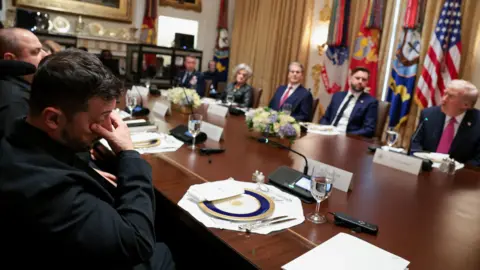 Reuters
ReutersGregory Meeks, the senior Democrat on the US House of Representatives Foreign Affairs Committee, called Trump’s policy “weakness through appeasement.”
Meanwhile, Polish Prime Minister Donald Tusk wrote on X that “appeasement has never been the path to a just and lasting peace”.
Although the Ukrainian president’s comments were a little more cautious — having learned the hard way not to criticize Trump too harshly — they suggested the same meaning.
“Ukraine will never reward terrorists for their crimes, and we take a similar stance on our partners,” Zelenskyy wrote on social media after returning to Kyiv.
As Russia made it clear it was not ready to end the fighting as the US president had hoped – pledging instead to go for more territory – the planned summit was put on ice.
Washington quickly sanctioned two of Russia’s largest oil companies – a sign of growing impatience with Putin.
While the economic impact on Russia is likely to be small, it represents a major shift in Trump’s foreign policy, having previously said he would not impose sanctions until European nations stopped buying Russian oil.
Even so, it is clear that a large gulf remains between US and European views on how to end the conflict.
This was reinforced when Zelensky met with various European leaders a few days later in Brussels and then in London.
More sanctions packages were agreed upon and progress was made toward using Russia’s own frozen assets to fund Ukraine’s war aims, though no final deal was reached.
Speaking alongside Zelensky in Downing Street on Friday, UK Prime Minister Sir Keir Starr pledged that he would work with his European partners to help provide more long-range weapons to fight on Russian territory.

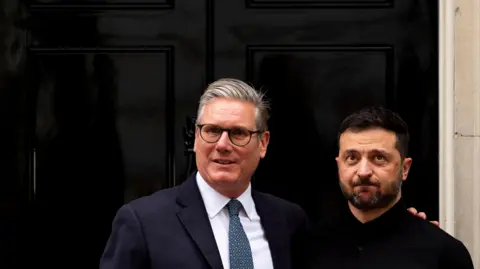 PA Media
PA MediaIt is easy to mock Britain’s policy of appeasement in the 1930s. Indeed, some did so even then.
“You can always appease the lions by throwing the Christians at them,” Harold Macmillan, a future prime minister and opponent of the policy, once said.
“But the Christians had another word for it.”
And yet we sometimes forget that the man most associated with this policy, then Prime Minister Neville Chamberlain, had significant American support, who feared a repeat of the horrors of the First World War.
President Trump is feeling the same fear today.
As Ukraine increases the effectiveness and frequency of its attacks on Russian oil depots and, in some cases, its power grid, the risk of an escalating war with the nuclear-armed nation should not be taken lightly.
The Russian leader knows this, recently warning that the use of foreign-supplied tomahawks could provoke a “serious, if not surprising” response.
But some Ukrainians I spoke to this week doubt that history’s lesson is true.
“Russia stops only when it is washed in its own blood,” said Yeven Mahda, a professor at Kyiv’s National Aviation University.
“Ukraine has proven this. The sooner the West understands, the better for all of us.”
At the market, surrounded by gourds and carrots grown in his own garden, Fedir said he too was awakened by the force of a nearby missile attack.
“Putin only understands power,” he said. “We need to destroy their airfields and their factories that manufacture these shells, bombs and missiles.”
There is a great danger in concessions, negotiations or appeasement – call it what you will – which, however well motivated, only serve to encourage authoritarian power.
“Does Europe think it will calm down after Ukraine,” he asked. “If he takes Ukraine, he will continue.”


Get our flagship newsletter with all the headlines you need to start your day. Sign up here.
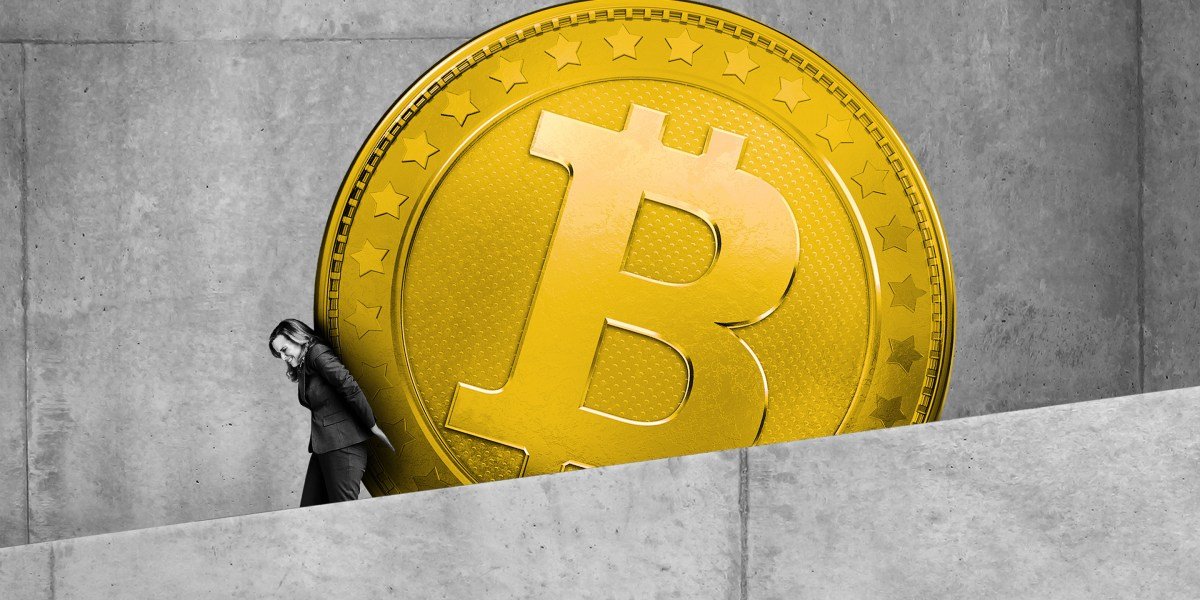












Post Comment